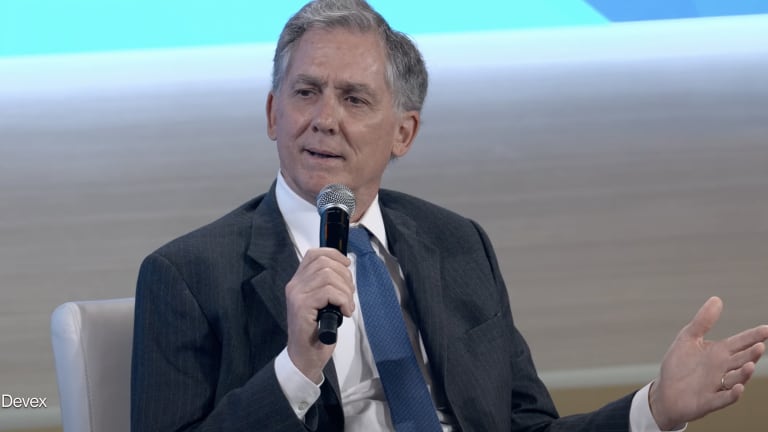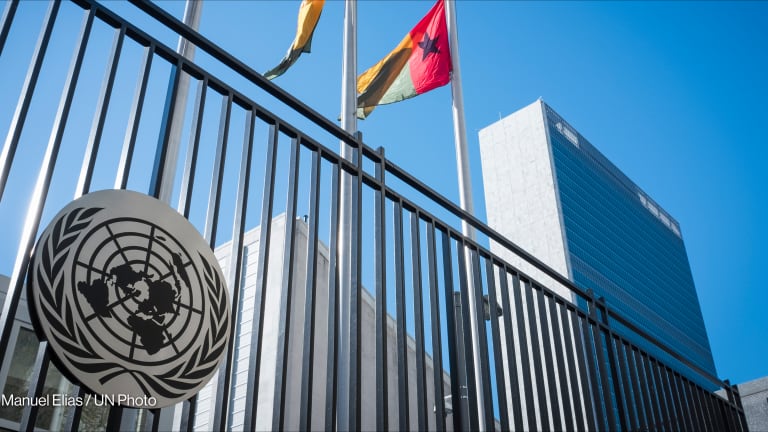What the US election means for global development
At Devex World in Washington, D.C., Republicans and Democrats shared their expectations for the direction that a Kamala Harris presidency or a Donald Trump presidency would take U.S. development efforts.
For most Americans, global development will not be the decisive factor when they cast their votes for Donald Trump or Kamala Harris next week, but their choice will be decisive for the U.S. government’s approach to foreign aid. Last Thursday — at the Devex World summit in Washington, D.C. — Republican and Democratic development experts with ties to both candidates shared their expectations for the direction each presidential hopeful would take U.S. development efforts if they find themselves in the Oval Office next year. If former President Donald Trump wins the election on Nov. 5, his administration would likely reduce the foreign aid budget, shift resources from United Nations agencies and NGOs to local and faith-based groups, eliminate climate change programs, and pursue better “alignment” between foreign aid agencies, according to former Trump administration officials James Richardson and Max Primorac. If Vice President Kamala Harris takes office, her administration would look to build multilateral alliances, generate private investment in development, and take a “metrics and accountability” approach to development, according to Democrats Jonathan Fantini-Porter and Ertharin Cousin. With just over a week until a presidential election currently considered a toss-up, the four experts addressed questions about the future of the U.S. aid workforce, waning public and political support for development, the likelihood of structural reforms, and the relationship between development and hot-button political issues such as migration and climate change. “It's our belief that the climate agenda has done a lot of harm and is actually driving more poverty,” said Primorac, who is a senior research fellow at the Heritage Foundation and a lead author of the conservative policy blueprint known as Project 2025. He also worked at USAID during the Trump administration. “The vice president's philosophy on change is rooted on, first and foremost, the idea of multilateral, alliance-based and partnership models,” said Fantini-Porter, who leads the Partnership for Central America, a White House initiative launched by Harris to address the root causes of migration. “We really do need to make sure that we are creating a much more unified response in our assistance efforts,” said Richardson, who directed the Office of Foreign Assistance in the U.S. State Department during the Trump administration and currently works for former Secretary of State Mike Pompeo. “She recognizes the importance of the institutions, but she also recognizes the importance of the people inside those institutions,” said Cousin, a former executive director of the World Food Programme and a Harris supporter. Trump 2.0 Both Trump supporters agreed that the foreign aid budget will likely go down. Richardson chalked this up to the “natural trend line” of appropriations, while Primorac pointed to low political support for aid among Republicans who believe it is ineffective. “The outcomes are not good,” Primorac said. “We have more poverty. We have more hunger. We have more … political instability.” During Trump’s previous term, his administration proposed cutting the U.S. foreign aid budget by roughly a third, and then attempted to override congressional appropriations and send the aid money back. Primorac said the likely reduction in funds should compel USAID to be even more focused on shifting its funds from international to local organizations. “They're cheaper,” he said. Primorac added that a Trump administration should “immediately” create a rule about prioritizing local organizations in order to “end this cannibalization of local NGOs.” Richardson hoped that Trump would appoint someone to a foreign aid leadership position with authority over all of the U.S. government’s development agencies. That would help ensure “structural coordination through an empowered leader,” he said. It would also mitigate the need to attempt reforms by “trying to move the boxes around,” which Richardson said “sounds really fun, but is actually miserable and ultimately doesn't result in the outcomes you're looking for.” The Heritage Foundation’s “Mandate for Leadership” policy proposal — the 900-plus page blueprint better known as Project 2025 — includes a highly controversial recommendation for reforming the federal workforce. It calls for pilot-testing at USAID an executive order that would convert a large number of career civil service positions into term-limited political appointments. Critics say this would result in a highly politicized workforce with less technical expertise. Trump has now distanced himself from Project 2025, but three months before the end of his presidential term, he issued an executive order to allow similar changes. Asked about this plan, which is included in the chapter he authored, Primorac said “it's really complex” and something he would “leave to the lawyers.” But he also criticized the current U.S. foreign aid workforce for not including enough Republicans. “When you look at the aid industry, unfortunately, there's such a disparity in political affiliation. That's just not good for democracy, it's not good for bipartisanship, and it's also not good for USAID if everybody’s in a bubble,” he said. The Harris doctrine In 2021, President Joe Biden tapped Harris to tackle the root causes of migration from Central America, and her leadership of the public-private partnership that resulted has given some indication of how she might approach development challenges as president. “It starts with a systemic vision, and it ends with a clear, accountable set of metrics on what is expected at the end of the day for results,” said Fantini-Porter of the Partnership for Central America. He warned against extrapolating too much from a single-issue example — calling it “a little early to suggest that this, in any way, is going to be the blueprint for anything.” But Fantini-Porter said that Harris has approached development challenges in Central America with particular appreciation for the power of leveraging private investment and working with the private sector as “an inextricable partner in those efforts.” Fantini-Porter suggested there might be an “opportunity” for additional reforms to multilateral institutions along the lines of what World Bank President Ajay Banga has undertaken to mobilize more funding. Banga was a founding co-chair of the partnership. Cousin — who now leads Food Systems for the Future — pushed back on the suggestion that Harris has less of a foreign affairs track record, from which to discern her approach to development. Cousin pointed to Harris’ efforts at the Munich Security Conference in early 2022 prior to Russia’s invasion of Ukraine. “She didn't just deliver a masterful presentation,” Cousin said. “She met with every single leader to articulate the case because they didn't know her, but by the time she left that building, they were ready to stand together.” Cousin said as vice president and as presidential candidate, Harris has delivered the message that no single country can deal with global changes alone — including “the challenges of the climate crisis, which is real.” Cousin praised Harris’ “ability to bring together disparate actors around the table to drive towards the solutions that are necessary.”
For most Americans, global development will not be the decisive factor when they cast their votes for Donald Trump or Kamala Harris next week, but their choice will be decisive for the U.S. government’s approach to foreign aid.
Last Thursday — at the Devex World summit in Washington, D.C. — Republican and Democratic development experts with ties to both candidates shared their expectations for the direction each presidential hopeful would take U.S. development efforts if they find themselves in the Oval Office next year.
If former President Donald Trump wins the election on Nov. 5, his administration would likely reduce the foreign aid budget, shift resources from United Nations agencies and NGOs to local and faith-based groups, eliminate climate change programs, and pursue better “alignment” between foreign aid agencies, according to former Trump administration officials James Richardson and Max Primorac.
This story is forDevex Promembers
Unlock this story now with a 15-day free trial of Devex Pro.
With a Devex Pro subscription you'll get access to deeper analysis and exclusive insights from our reporters and analysts.
Start my free trialRequest a group subscription Printing articles to share with others is a breach of our terms and conditions and copyright policy. Please use the sharing options on the left side of the article. Devex Pro members may share up to 10 articles per month using the Pro share tool ( ).
Michael Igoe is a Senior Reporter with Devex, based in Washington, D.C. He covers U.S. foreign aid, global health, climate change, and development finance. Prior to joining Devex, Michael researched water management and climate change adaptation in post-Soviet Central Asia, where he also wrote for EurasiaNet. Michael earned his bachelor's degree from Bowdoin College, where he majored in Russian, and his master’s degree from the University of Montana, where he studied international conservation and development.








